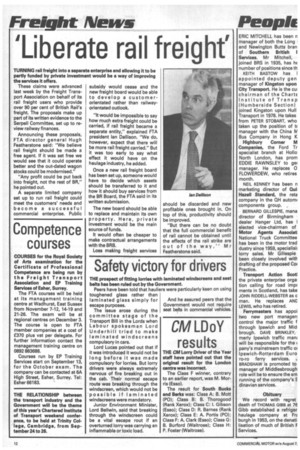'Lib erate ra il freig
Page 8

If you've noticed an error in this article please click here to report it so we can fix it.
TURNING rail freight into a separate enterprise and allowing it to be partly funded by private investment would be a way of improving the services it offers.
These claims were advanced last week by the Freight Transport Association on behalf of its rail freight users who provide over 90 per cent of British Rail's freight. The proposals make up part of its written evidence to the Serpell Committee, set up to review railway finances.
Announcing these proposals, FTA director general Hugh Featherstone said: "We believe rail freight should be made a free agent. If it was set free we would see that it could operate better and the out-dated wagon stocks could be modernised."
"Any profit could be put back into freight, not the rest of BR," he pointed out A separate limited company set up to run rail freight could meet the customers' needs and become a successful commercial enterprise. Public subsidy would cease and the new freight board would be able to develop a customerorientated rather than railwayorientated outlook.
"It would be impossible to say how much extra freight could be carried, if rail freight became a separate entity," explained FTA president Ian Dallison. "We do, however, expect that there will be more rail freight carried." But it was too early to say what effect it would have on the haulage industry, he added.
Once a new rail freight board has been set up, someone would have to decide which assets should be transferred to it and how it should buy services from the BR Board, the FTA said in its written submission.
The new board should be able to replace and maintain its own property. Here, private investment would be the main source of funds.
It would often be cheaper to make contractual arrangements with the BRB.
Loss making freight services should be discarded and new profitable ones brought in. On top of this, productivity should be improved.
"But there can be no doubt that the full commercial benefit of rail cannot be obtained until the effects of the rail strike are out of the way," Mr Featherstone said.






















































